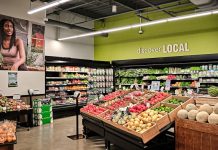
It’s nearing noon on Thursday at Wayne County Community College. Up on the third floor, in sewing rooms, tables are covered in patterned fabrics, delicate trims, and colorful beads. Basmah, Dior, Rose, and Salima are just a few of the refugee women working to put the finishing touches on a midi-length brown dress — a project they’ve been working on for the past few weeks. “I’ve always loved sewing. It’s in my blood,” says Dior, who came to the U.S. from Senegal a few years ago. Each of these women brings their own story of resolve, resourcefulness, and renewal to the weekly sewing class administered by Refuge for Nations.
A nonprofit social enterprise based in metro Detroit, Refuge for Nations seeks to empower immigrant and refugee women. Since 2013, it‚Äôs been under the fastidious watch of Cynthia Khan, herself an immigrant from Lahore, Pakistan. Khan has a maternal, almost protective demeanor, and her circle of volunteers, refugees, and immigrant women feels like an intimate sisterhood. ‚ÄúHumanity is universal, and so I love everyone,‚Äù she says. Khan married in 1978, and by 1983, she relocated from Pakistan to Saudi Arabia, where her husband had already moved. There, she worked at an international school that drew in students from more than 60 countries, where it became clear to her that the suppression of women was not limited to her own experience in Pakistan. It was an international dilemma. Starting Refuge for Nations was always a question of when, not if. ‚ÄúI thought, I can do something to help these women get out of their homes, because they are very talented. I want to give them an opportunity to assimilate and integrate into the system, and not be so isolated.‚Äù When she and her family moved to Windsor in 1995 for her husband‚Äôs work, Khan began laying the groundwork for Refuge for Nations. She commuted between Windsor and metro Detroit, broadly helping refugee communities connect with the appropriate facilities and translating information between Urdu, Hindi, and Punjabi. In 2013, Khan began noticing that refugee women were particularly in need of employment ‚Äî that‚Äôs when she decided to step in. Ã˝

Presently, Refuge for Nations has three centers across metro Detroit. One in Detroit, one in Dearborn, and one in Clinton Township. Apart from the weekly sewing class, which it started offering in 2018, the organization‚Äôs most popular and original service has been its English as a Second Language program. ‚ÄúWe also help with food, clothing, furniture, housing, and work with different agencies that bring refugees here like Samaritas,‚Äù Khan adds. Across metro Detroit, there are several agencies, organizations, and even institutions that provide many of these same forms of assistance. What makes Refuge for Nations distinctive is its efforts to take reintegration one step further. In 2017, the organization became a social enterprise by taking sewing and stitching commissions from local businesses. ‚ÄúThese companies want to get things done through us because they want to attach a story to their product,‚Äù Khan says. Some of the companies they are working with include MyHydrationPack (the women make backpacks), Men‚Äôs Warehouse (they make suits and assist with alterations), and various up-and-coming small businesses (this includes an evening clutch line and a party business for which the women make costumes). Refuge for Nations‚Äô own signature product, sold on their website, is an essential oil bag featuring 10 pockets. ‚ÄúIt‚Äôs one of the best products that women learn how to make.‚ÄùÃ˝

Ultimately, Refuge for Nations does not just teach women how to survive; it aims to help them succeed. Much of that stems from Khan‚Äôs keen understanding of the social and cultural barriers that can make integration into American society so difficult for these women. ‚ÄúIt comes naturally to me because I have lived within those boundaries, so I understand it,‚Äù she says. ‚ÄúYou also have to have the passion to work so hard without any monetary gains. But the biggest reward for me is that these women befriend us. We become a family.‚Äù It‚Äôs clear why the word empower is so central to Khan‚Äôs messaging. Her mission is all about uncovering women‚Äôs innate strength. Ã˝
|
| Ã˝ |
|











